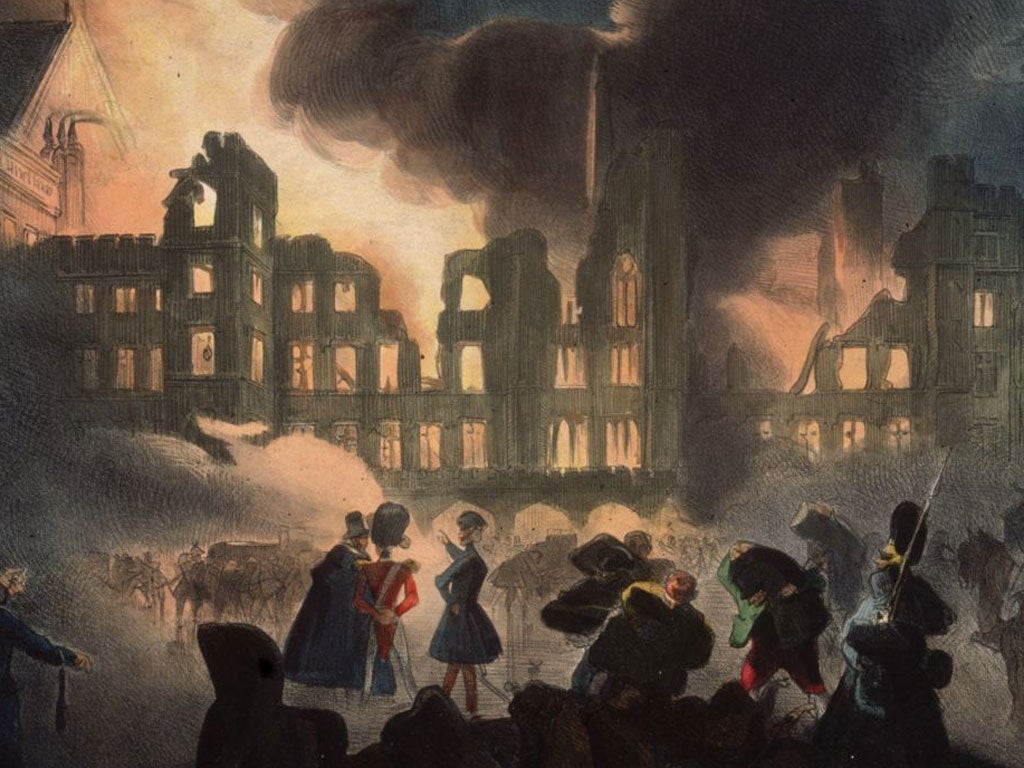The Day Parliament Burned Down, By Caroline Shenton
The familiar Palace of Westminster that we know today arose from the ashes of disaster

Your support helps us to tell the story
From reproductive rights to climate change to Big Tech, The Independent is on the ground when the story is developing. Whether it's investigating the financials of Elon Musk's pro-Trump PAC or producing our latest documentary, 'The A Word', which shines a light on the American women fighting for reproductive rights, we know how important it is to parse out the facts from the messaging.
At such a critical moment in US history, we need reporters on the ground. Your donation allows us to keep sending journalists to speak to both sides of the story.
The Independent is trusted by Americans across the entire political spectrum. And unlike many other quality news outlets, we choose not to lock Americans out of our reporting and analysis with paywalls. We believe quality journalism should be available to everyone, paid for by those who can afford it.
Your support makes all the difference.Yes, there was a smell of something burning in the House of Lords on 16 October 1834. In fact, it was hard to see across the smoky Chamber. Also, the floor near Black Rod's box was too hot to touch. But not to worry: it was just the men below carefully burning some unwanted wood in the furnaces. The Housekeeper of the Lords, a combination of Security and Health-'*'-Safety, was keeping an eye on this sort of thing, or would have been if she hadn't delegated everything except the salary to her deputy, who on the day was away, leaving everything to her own mother-in-law, who was moonlighting as a tourist guide while the underfloor temperature soared.
The senior of the two men defying orders, by cramming the sticks into the stoves, was not the kind of employee to be entrusted with the fate of the Palace of Westminster. He had just emerged from a lengthy sentence at the nearby prison. As Caroline Shenton, Clerk of the Records in the parliamentary archives, shows in her excellent book, even the wood shoved into the furnaces was the product of the stranglehold of inefficient tradition. In chapters headed with each successive hour of the fire's inexorable progress, she charts the frenetic and misguided efforts of staff and firemen to douse the inferno and snatch papers and property from the flames. Slipped into this saga are background snippets to explain how the Mother of Parliaments got itself into this granddaddy of a mess in the first place.
Take those sticks which accidentally became kindling. A "tally" was a small, notched piece of wood which in medieval times served as a receipt for government income. As Dickens pointed out, pen and paper had been around for a while; yet the antique system dragged on at Westminster until 1826. The last tallies were not disposed of until that fateful day in 1834.
Among the most hidebound of the jobsworths was the Dean of Westminster, who refused to move the Domesday Book to safety in the nave of the Abbey. He had not received the Prime Minister's permission. The king appeared to treat the inferno as some kind of light show. Fortunately there were many who pitched in, ranging from two of the William IV's illegitimate sons to the firemen who pumped – by hand – the water via their rudimentary apparatus.
As the flames darted around like wild creatures and roofs crashed down, there were many injuries but no deaths. Cometh the hour, cometh the men like Rowland Hill, a general who had his horse shot from under him at Waterloo and who now organised a firewall to save the 11th-century Westminster Hall. This book ignites our interest in the forgotten fire of 1834. And what of the Westminster conflagrations of 1263, 1298,1315, 1512 and 1549? We've forgotten those too.
Buy The Day Parliament Burned Down (Oxford) from independentbooksdirect.co.uk for £14.99 (RRP £18.99) including postage or call 0843 0600030
Join our commenting forum
Join thought-provoking conversations, follow other Independent readers and see their replies
Comments